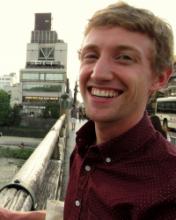The Mellon/ACLS Dissertation Completion Fellowships Program awards 65 fellowships annually. The fellowships support a year of research and writing to help advanced graduate students in the humanities and social sciences in the last year of PhD dissertation writing. Current anthropology graduate student, Ian Kretzler, received this award for 2018-19 to support the completion of his dissertation entitled "Landscapes of Survivance: Archaeology of Reservation Lifeways at Grand Ronde." Ian is a 7th year student, completing a degree within the department's archaeology PhD track program. His research focuses on the development of collaborative forms of archaeological practice alongside Native American communities, especially in the Pacific Northwest. He currently works with the Historic Preservation Office of the Confederated Tribes of Grand Ronde in northwestern Oregon.
What brought you to anthropology?
When I entered college, majoring in anthropology was not part of my plan. I initially wanted to focus my studies on biomedical sciences. That changed with my first anthropology class. The class focused on human evolution, and I remember being fascinated by how much hominin fossils could tell us about our evolutionary history. With additional coursework, I came to see anthropology as a way to learn about human history, cultural diversity, the natural world, and the ways all three have affected each other. After officially joining the anthropology major, I began to think more seriously about how I wanted to use my degree. My interests began to narrow to one particular question. I grew up in Washington and had always been interested in the archaeological history of the Northwest Coast, but it wasn’t until late in my junior year that I realized that while this research concerned itself with Native American heritage, it rarely mentioned contemporary Native people or communities. Why was that? This question led me to my undergraduate thesis project, which focused on debates surrounding repatriation, and ultimately to graduate school at UW.
How would you describe your field of study/research to a friend who is not in your graduate program?
I would tell them that I work in the field of indigenous archaeologies, which examines how archaeological practice can be used to support Native American tribal nations in the protection and celebration of their heritage.
What drew you to your topic?
I’ve heard that some graduate students choose their dissertation topics, others are chosen by their dissertation topics. I fall into the latter category. In July 2014, one of Grand Ronde’s archaeologists, Briece Edwards, called me to ask if I would be interested in in contributing to a cartography project they were developing. I had met Briece that spring and was interested in working with Grand Ronde, but at the time didn’t think GIS or archival research would be central components of my research. Even so, I was happy to join the project. My work focused on using historic maps and documents to track changes in land use and ownership on the Grand Ronde Reservation during the nineteenth and early twentieth centuries. Along the way, I became intrigued by the multiple, conflicting stories within these sources. Under the surface of official discourse celebrating the “civilizing” progress of the Native community lay strategies taken by Native families to preserve and adapt cultural practices, relationships with their historical neighbors, and ties to their ancestral homelands. These strategies became the subject of my dissertation project, which pairs insights from this mapping project with archaeological research on reservation households.
What’s been your experience so far?
I’ve been lucky to be a part of the Field Methods in Indigenous Archaeology (FMIA) training program. Co-directed by Professor Sara Gonzalez of UW and the Grand Ronde Historic Preservation Office, FMIA offers a summer field school on the Grand Ronde Reservation, providing training in archaeological field techniques and community-based research methods to undergraduate students and tribal members. I have served as a teaching assistant and field supervisor for FMIA over the project’s four field seasons. Living with and learning from the Grand Ronde community has been a wonderful experience. It has deepened my understanding of the role cultural heritage plays in strengthening descendant communities’ connections to place and practice and challenged me to examine archaeological practice itself, how it has been used to alienate Native people from their heritage, and how it can be transformed today into an avenue for social good.
What do you enjoy most about Seattle?
I enjoy being able to watch my Seattle Mariners in person and, on occasion, see them win.
What’s next?
Good question! Completing my dissertation is my main priority this year, but I am thinking about post-graduation plans. My goal career-wise is to be in a position where I can contribute to tribal historic preservation, whether as an academic archaeologist or within the wider cultural resources management industry.
What advice would you give to your past self about graduate school?
Leaving college, I had an idea of what I wanted to do with my degree. But graduate school has taught me that opportunities can appear without notice and wind up dramatically changing — for the better — your interests, plans, and work. So I would say to take advantage of opportunities while you can. Because you never know where they will lead.
